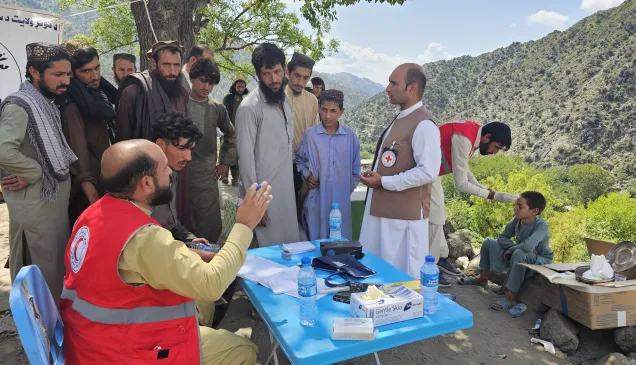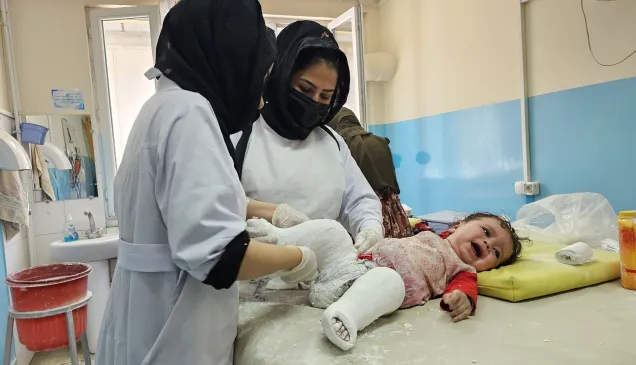Afghanistan: Assisting communities grappling with the impact of climate change
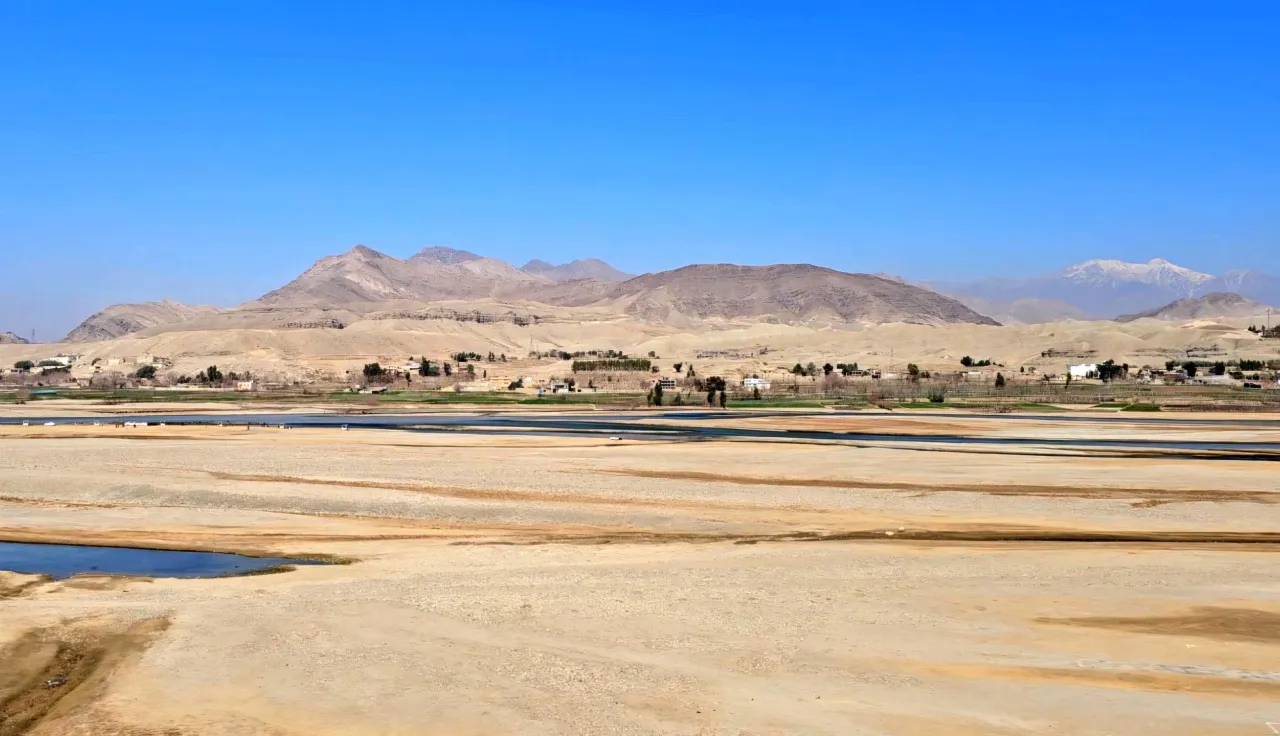
Afghanistan is currently regarded among the ten countries most vulnerable to climate change, which is expected to adversely impact its environment, economy and population. According to climate change experts, the country’s annual average temperatures are expected to be 1.7–1.9°C higher by the 2050s, which in turn will lead to a scarcity of fresh water due to the shrinking snow cover and glaciers in the Hindu Kush and Pamir Mountain ranges.
Decades of conflict and violence, underinvestment in critical infrastructure and economic challenges have weakened the country’s capacity to tackle the growing threats posed by climate hazards. Despite the urgent need for adaptation strategies, Afghanistan's involvement in key international forums like the Conference of the Parties of the United Nations Framework Convention on Climate Change (UNFCCC) has been limited, hindering access to critical global climate funding. Consequently, the escalating impact of climate change has exacerbated the country’s continuing humanitarian challenges.
Agriculture is the primary means of livelihood for nearly 80 per cent of Afghans. Agricultural livelihoods have been one of the biggest casualties of extreme climate events, such as droughts, unseasonal rainfall and floods, leading to crop failures, reduced yields and worsening food insecurity for over 14 million people. This has also resulted in significant economic loss, infrastructure damage and increasing poverty, which in turn has forced more people to be displaced from their homes and livelihoods.
The International Committee of the Red Cross (ICRC) strives to provide expertise and support to help mitigate and adapt to the effects of climate change in Afghanistan.
Our efforts include projects aimed at supporting communities through improved water management and a stable electricity supply and protecting agricultural livelihoods. We help overcome environmental and humanitarian challenges through protective, preventive and responsive measures. - Katharina Ritz, ICRC head of delegation in Afghanistan.
Preventive actions focus on taking mitigating steps such as reducing carbon emissions by installing solar plants and connecting essential services to the power grid. The ICRC also supports various protective measures such as the construction and repair of check dams, canals, gabion and stone walls to prevent erosion and flooding of agricultural land, and to recharge aquifers. In terms of responsive actions, our work aims at helping communities access water and essential services by providing material and technical support to the Afghan Red Crescent Society and relevant authorities in order to improve water systems and counter the long-term challenge of decreasing water levels.
Moreover, we employ sustainable approaches in our operations, such as working with communities to develop innovative, environment-friendly and climate-smart solutions to optimize the use of limited land, water and other resources.
Here is an overview of ICRC projects designed to create lasting, positive change for communities across Afghanistan, while adapting to the growing risks of climate change.
Transitioning to greener and more stable energy supplies for communities
To resolve the challenges of traditional energy supply systems, such as high costs, unreliability and harmful emissions, we have supported projects across Afghanistan to implement a shift from diesel generators to sustainable alternatives.
Highlights of key preventive actions and the benefits of ensuring clean and consistent power supply:
-
Improved supply of clean water for 53,900 residents in Kabul after the energy supply system for six boreholes was converted from diesel generators to solar power.
-
Reliable water supply was ensured for 47,600 residents as the water system in Kabul's Zone 8 switched to solar power.
-
Connected the water pumping stations in Gardez, previously reliant on 150-kilowatt diesel generators, to the recently upgraded power grid, resulting in more stable water supply for 49,000 residents.
-
In July 2024, Maimana's water supply system underwent a significant upgrade with the installation of solar panels, controllers and a 15-kilowatt submersible pump at well no. 2, resulting in better access to clean water for 18,970 Maimana residents.
By providing consistent power supply, optimizing operational costs and reducing greenhouse gas emissions, these ICRC-supported initiatives have ensured uninterrupted water supply for Afghan people while supporting a greener future.
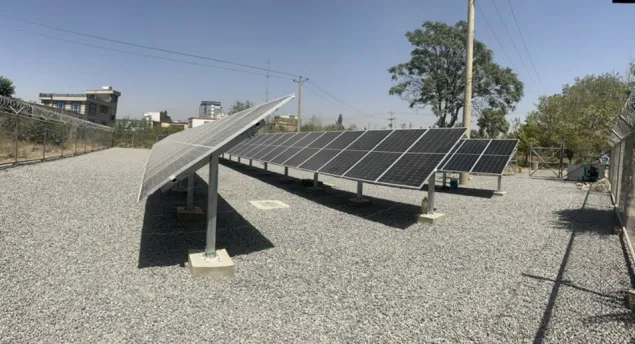
Solar panels were installed at six boreholes in Kabul to ensure a more stable supply of clean water to residents.
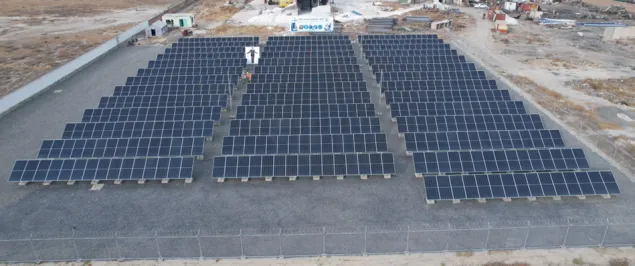
Series of solar panels installed to help the water supply system in Kabul's Zone 8 become more efficient and environment-friendly.
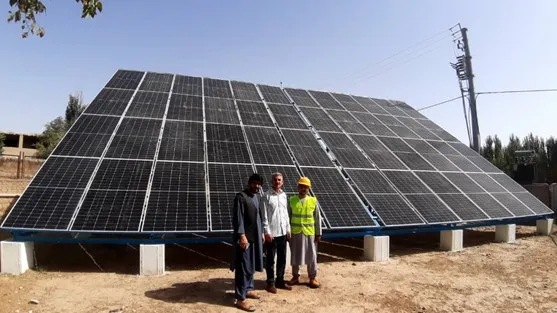
An Official (right side) and ICRC staff (middle and left side) at the site of the installed solar panels for well no. 2 of Maimana's water supply system.
Refurbishing ageing water infrastructure to improve access to clean water and adapt to climate-related challenges
Climate change-induced drought and depletion of groundwater levels have led to the drying up of many wells in both urban and rural areas. Compounded by rapid urbanization, this has put an additional stress on ageing water infrastructure. As part of our broader effort to improve the access of communities to clean and safe water and support their adaptation to climate-related challenges, we have provided our expertise and support to the repair and upgrade of deteriorating infrastructure in various parts of the country.
Some of our responsive actions included:
-
Providing support for refurbishing three crucial water pumping stations in Shora-e-Olama, Fazil Kandahari and Shirkat-e-Miwa in Kandahar, to ensure reliable water supply for 13,120 residents.
-
In Herat, our teams supported the replacement and extension of 5.86 kilometres of the water pipeline network in Districts 7, 14 and 15, which fixed issues of reliability and reduced health-related risks for 12,000 residents.
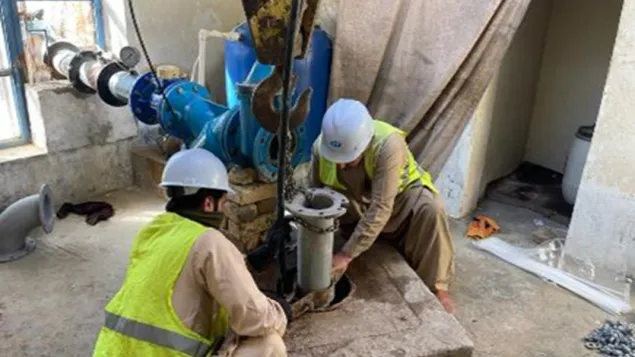
Ageing pipes and other infrastructure are being refurbished at a water pumping station in Kandahar.
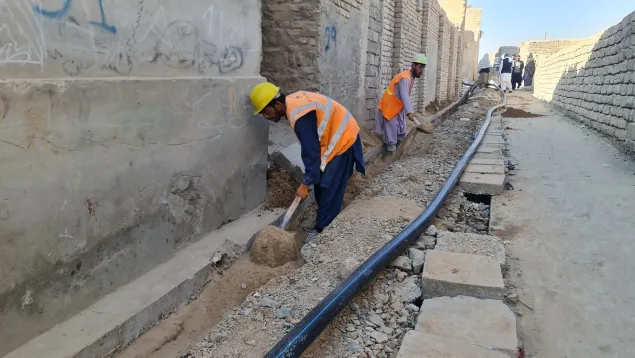
New polyethylene pipes being laid in Kandahar to provide reliable access to safe and clean water without wastage.
These upgrades have been crucial in providing reliable access to clean water and reducing water wastage, thus ensuring a transition to a more sustainable system. This is line with our strategy to focus on strengthening critical water infrastructure to support communities’ access to clean water. - Katharina Ritz
Safeguarding agricultural livelihoods by rebuilding and restoring irrigation canals
Decades of conflict, economic hardship, droughts and flash floods have left sizeable portions of farmlands across the country uncultivable and several canals unusable. Consequently, the livelihoods of local communities have been severely jeopardized, forcing many to leave their homes in search of work and aid.
To overcome these challenges to agricultural cultivation and irrigation, ICRC teams:
-
helped 28,000 residents in Hesarak, Nangarhar, to revitalize 835 hectares of agricultural land by supporting the restoration of vital irrigation infrastructure to enable renewed cultivation.
-
supported seven village communities in Gulistan district, Farah province, to reduce the damage caused by annual floods to their irrigation canals and farmlands. A rebuilding project including the construction of gabion and stone walls to protect the canals and farmlands against erosion was initiated.
These protective measures were implemented by community members through our cash-for-work programme. The initiative provided financial compensation for their work and trained them in maintaining the infrastructure under expert guidance.
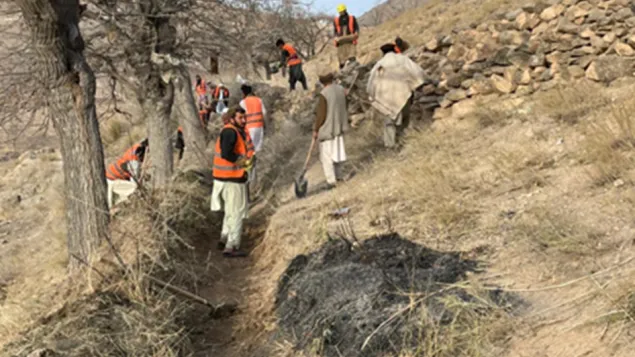
Local community members rebuilding irrigation canals in Hesarak, as part of our cash-for-work initiative.
Beyond immediate agricultural benefits and enabling continued livelihoods, these projects have ensured agricultural sustainability by improving water conservation and reducing energy-intensive irrigation practices, thus strengthening the community’s resilience to climate change.
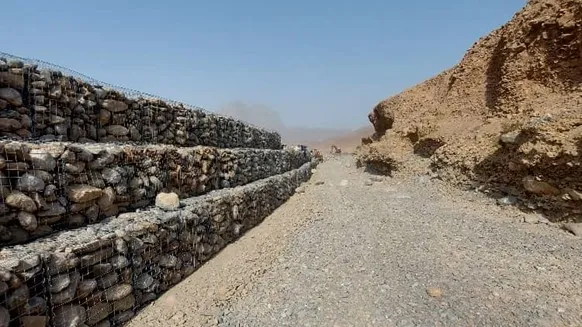
Gabions and stone walls were constructed in Gulistan district to protect canals and farmland against erosion during floods.
Despite the country’s minimal contribution to global emissions, Afghanistan was ranked the sixth most climate vulnerable country in the world and fourth in overall disaster risk in 2023. It is thus urgent to implement coordinated measures which simultaneously mitigate the risks and help communities adapt to environmental changes, in order to reduce the long-term and short-term humanitarian impact of climate change on the people of Afghanistan.

